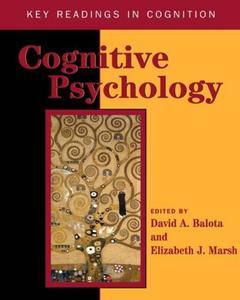Cognitive Psychology Key Readings Key Readings In Cognition Series
Coordonnateurs : Balota David, Marsh Elizabeth

Part 1.Methods and Theories in Cognitive Psychology. D.A. Balota, E.J.Marsh, Cognitive Psychology: An Overview. Part 2. Methodological Perspectives.S. Sternberg, Vision: A Computational Investigation Into the Human Representation and Processing of Visual Information, Memory-scanning: Mental Processes Revealed by Reaction-time Experiments. D.E. Rumelhart, J.L. McClelland, G.E. Hinton, The Appeal of Parallel Distributed Processing. C. Sacchett, G.W. Humphreys, Calling a Squirrel a Squirrel But a Canoe a Wigwam: A Category-specific Ddeficit for Artefactual Objects and Body Parts. S.E. Petersen, P.T. Fox, M.I. Posner, M.A.Mintun, M.E. Raichle, Positron Emission Tomographic Studies of the Cortical Anatomy of Single Word Processing. Part 3. Pattern Recognition.U. Neisser, Pattern Recognition. P.D. Eimas, J.D.Corbit, Selective Adaptation of Linguistic Feature Detectors. D.J. Simons, D.T.Levin, Failure to Detect Changes to People During a Real-world Interaction. F. Tong, K. Nakayama, J.T. Vaughan, N. Kanwisher, Binocular Rivalry and Visual Awareness in Human Extrastriate Cortex. Part 4. Attention.E.C. Cherry, Some Experiments on the Recognition of Speech, With One and With Two Ears. J.R. Stroop, Studies of Interference in Serial Verbal Reactions. M.I. Posner, C.R.R.Snyder, Attention and Cognitive Control. S.P. Tipper, Selection for Action: The Role of Inhibitory Mechanisms. Part 5. Imagery. S.M. Kosslyn, T.M.Ball, B.J. Reiser, Visual Images Preserve Metric Spatial Information: Evidence From Studies of Image Scanning. R.N. Shepard, J.Metzler, Mental Rotation of Three-Dimensional Objects. R.A. Finke, S. Pinker, M.J. Farah, Reinterpreting Visual Patterns in Mental Imagery. M.J. Farah, The Neural Basis of Mental Imagery. Part 6. Episodic Memory.F.I.M. Craik, E.Tulving, Depth of Processing and the Retention of Words in Episodic Memory. E.F. Loftus, D.G. Miller, H.J. Burns, Semantic Integration of Verbal Information Into a Visual Memory. L.L. Jacoby, V. Woloshyn, C. Kelley, Becoming Famous Without Being Recognized: Unconscious Influences of Memory Produced by Dividing Attention. H.L. Roediger III, K.B. McDermott, Creating False Memories: Remembering Words Not Presented in Lists. A. Baddeley, Working Memory. D. Bruce, A. Dolan, K.Phillips-Grant, On the Transition From Childhood Amnesia to the Recall of Personal Memories. E. Tulving, How Many Memory Systems are There?
Part 7. Using and AccessingPre-existing Knowledge Structures.A.M. Collins, M.R. Quillian, Retrieval Time From Semantic Memory. D.A. Balota, R.F. Lorch, Jr, Depth of Automatic Spreading Activation: Mediated Priming Effects in Pronunciation But Not in Lexical Decision. R. Brown, D.McNeill, The "Tip of the Tongue" Phenomenon. J.D.Bransford, M.K. Johnson, Contextual Prerequisites For Understanding: Some Investigations of Comprehension and Recall. Part 8. Categorization.E. Rosch,C.B. Mervis, W.D. Gray, D.M. Johnson, P. Boyes-Braem, Basic Objects in Natural Categories. M.I. Posner, S.W. Keele, On the Genesis of Abstract Ideas.D.L. Medin, Concepts and Conceptual Structure.
Part 9. Language Development.V. Fromkin, S. Krashen,S. Curtiss, D. Rigler, M. Rigler, The Development of Language in Genie: A Case of Language Acquisition Beyond the "Critical Period". J. Berko, The Child's Learning of English Morphology. J.R.Saffran, R.N. Aslin, E.L. Newport, Statistical Learning by Eight-Month-Old Infants. G.F. Marcus, S. Vijayan, S.B. Rao, P.M. Vishton, Rule Learning by Seven-Month-Old Infants.
Part 10. Language. V.A. Fromkin, The Non-anomalous Nature of Anomalous Utterances. D.A. Swinney, Lexical Access During Sentence Comprehension: (Re)Consideration of Context Effects. N. Geschwind, Language and the Brain. D.A. Robertson, M.A. Gernsbacher, S.J. Guidotti,R.R.W. Robertson, W. Irwin, B.J. Mock, M.E. Campana, Functional Neuroanatomy of the Cognitive Process of Mapping During Discourse Comprehension. Part 11. Judgment and Decision-Making.A.Tversky, D. Kahneman, The Framing of Decisions and the Psychology of Choice. A. Tversky, D. Kahneman, Judgment Under Uncertainty: Heuristics and Biases. A. Tversky, T. Gilovich, The Cold Facts About the "Hot Hand" in Basketball. Part 12. Reasoning and Problem Solving. M.L. Gick, K.J. Holyoak, Schema Induction and Analogical Transfer. M.K. Kaiser, J. Jonides, J.Alexander, Intuitive Reasoning About Abstract and Familiar Physics Problems. K.A. Ericsson, N.Charness, Expert Performance: Its Structure and Acquisition. Appendix. H.L. Roediger III, D.A.Gallo, Reading Journal Articles in Cognitive Psychology.
David Balota is a Cognitive Psychologist working in the areas of Psycholinguistics and Age-Related Changes in Attention and Memory. His work has been consistently been funded by NIH and/or NSF. In addition to being on numerous editorial boards, he has been Associate Editor at the Journal of Memory and Language and is currently Editor for the Psychonomic Bulletin and Review. He is currently President of Division 3, Experimental Psychology, and is on the governing board of the Psychonomic Society.
Elizabeth Marsh received her PhD in Cognitive Psychology from Stanford University in 1999. She completed an NIMH funded postdoctoral research fellowship at Washington University before moving to her present faculty position at Duke University. Her research is focused on human memory, especially autobiographical memories, the acquisition and source of general world knowledge, and memory illusions.
Date de parution : 09-2004
Ouvrage de 784 p.
Date de parution : 07-2005
17.8x22.9 cm



